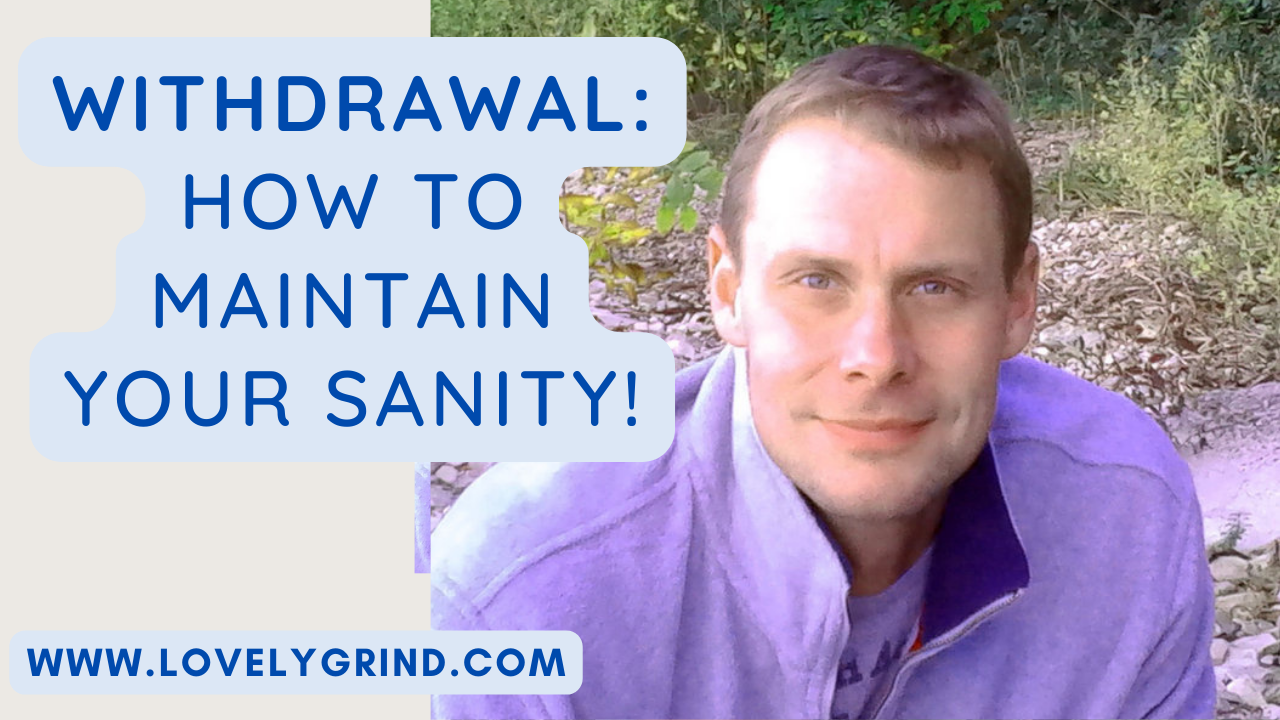How to Maintain Your Sanity During Withdrawal
Jan 24, 2023
Did you see my most recent YouTube video, the one about maintaining sanity during withdrawal? If not, I encourage you to check that out at the link below.
YouTube Link: How to Maintain Your Sanity
But also, in this post I'll share a few points that summarize what the video was about. In it I share an entry from a journal I kept during withdrawal, and then I go on to share important "take-home" points to help you along your own healing journey.
If you enjoy the post below, and the YouTube video, then you'll enjoy my Support & Success monthly membership area. In that exclusive members' area I share all of my withdrawal journal posts, as well as a whole bunch of other videos, meditations, audio devotions, and inspirational posts to help you move forward in the healing process. You can join today by clicking the link below!
Become a Support & Success Member Here!
I hope to see in Support & Success. I know you'll find it valuable!
Withdrawal Journal Entry # 9 – Trying to Maintain Sanity
Friday, January 17, 2014
Yesterday the physical pain was almost unbearable in the evening. Leg, back, neck, head, and abdominal pain made it feel as if I had been in a terrible accident. Today has been mental: unable to think straight, focus, speak with people for very long, feel as if going insane, unable to get out of head for a larger perspective, almost out of breath when trying to think. The feeling of unreality is bad as well. The feeling of not being able to do learn a new task, hold a new thought or maintain a normal conversation without someone knowing something is wrong is pretty bad.
Day 2 at work with no meds.
Why This Journal Entry Is Interesting
- The physical pains of withdrawal can be extreme, and it is at times difficult to describe that severity to others. However, in the privacy of my journaling, I was able to “say how it really felt” – as if I’d been in an accident. That is how I felt at the time!
- As difficult as the physical pains can be, the mental stuff is probably more difficult to deal with, as it can make a person question their sanity on a minute-to-minute basis. Finding a way to stay grounded mentally is paramount in healing.
- Two of the overarching mental difficulties that people experience in withdrawal, and that I was experiencing here are: 1) feelings of being stuck in the head, unable to focus on things other than my thoughts and difficulties 2) worries of “losing it” mentally, of going insane
- Despite this crazy mix of physical and mental withdrawal symptoms that I was experiencing, I was back at work (after my grandmother’s funeral). Trust me, I didn’t look pretty to others or function at my highest level, but by the grace of God I gutted it out one day at a time. And then did it again the next day.
The Take-Home Points from this Journal Entry
- If you haven’t already begun journaling, it would be a good idea. It is often difficult to talk openly about what we are experiencing with other people in our lives. This “hiding” in and of itself is stressful, but writing a little bit each day about what you are going through will help to get it out of your head. You can be honest and open with your journal, and it will help you to feel better by writing about some of what you are going through.
- Find a way to “stay grounded” mentally and emotionally during healing. Mentally it is far too easy to go down “unproductive rabbit’s holes” and unhealthy thought tangents, so each person must have something they come back to in order to feel safe and sane. Focus on simple truths when experiencing mental symptoms and worry. Talk to a loved one. Focus on God’s word and on His promises. And find ways to distract and clear the head through exercise, meditation, and small projects.
- It is important, for so many reasons, to find ways to distract the attention in a positive way during healing. The withdrawal mind, left to its own devices, will focus on pains, problems, and fear – 24/7. That is just the reality. So, in order to get out of this cycle, a person must force him or herself to do other things and focus on other things. For example, at the time I felt I would have been better off if I didn’t have to go to work. But looking back, I can guarantee that it was better for me to be struggling through a workday than left at home alone and ruminating to an even stronger degree. If you can work, even part-time, that is great. If not, find other ways to get out of the house – running errands, going to a church group, getting to the gym, walking in the park. Force yourself to get involved in small projects, and force yourself to talk to people, preferable about something other than withdrawal, even for a few minutes a day. It is always a good idea to find something other than withdrawal to focus on. The more a person can do this, the better off you will be.
Would You Like to Join My Members Only Support & Success Community?
Stay connected with news and updates!
Join my mailing list to receive the latest posts and updates from The Lovely Grind.
Don't worry, your information will not be shared.
We hate SPAM. We will never sell your information, for any reason.
